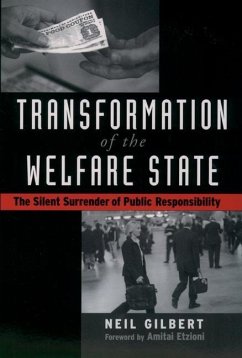Gilbert finds a fundamental transformation in the welfare state - a turn away from broad-based entitlements and automatic benefits to a new, "enabling" approach defined by policies designed to promote privatization and labor force participation. He provides tangible evidence of how these new systems promote work and responsibility over protection and how they thicken the glue of civil society by diluting the pervasive role of government. Translating the new language of solidarity, activation, and social inclusion that has accompanied these changes, Gilbert reveals that these shifts have had surprisingly broad-based support. Traditional welfare supporters on the left are silently implementing reforms long associated with the policy agenda of the Right. Gilbert concludes with policy recommendations intended to temper the harder, unforgiving edges of this new social protection mentality with pragmatic assistance for those left behind. Illuminating a fundamental shift in the design of modern welfare systems, this landmark work is a must-read for anyone concerned with social policy today.
How much has really changed in the world of welfare? A great deal, according to Neil Gilbert, one of our most deeply engaged and thoughtful analysts of social welfare policy. In this panoramic inquiry, Gilbert spans the globe to assess, in provocative yet dispassionate fashion, what welfare looks like in a free market world. From Sweden to the U.S., Gilbert finds a fundamental transformation in the welfare state--a turn away from broad-based entitlements and automatic benefits to a new, "enabling" approach defined by policies designed to promote privatization and labor force participation. He provides tangible evidence of how these new systems promote work and responsibility over protection and how they thicken the glue of civil society by diluting the pervasive role of government.
How much has really changed in the world of welfare? A great deal, according to Neil Gilbert, one of our most deeply engaged and thoughtful analysts of social welfare policy. In this panoramic inquiry, Gilbert spans the globe to assess, in provocative yet dispassionate fashion, what welfare looks like in a free market world. From Sweden to the U.S., Gilbert finds a fundamental transformation in the welfare state--a turn away from broad-based entitlements and automatic benefits to a new, "enabling" approach defined by policies designed to promote privatization and labor force participation. He provides tangible evidence of how these new systems promote work and responsibility over protection and how they thicken the glue of civil society by diluting the pervasive role of government.








